Approved Projects
22
Approved projects
Priority 1 – Green border region

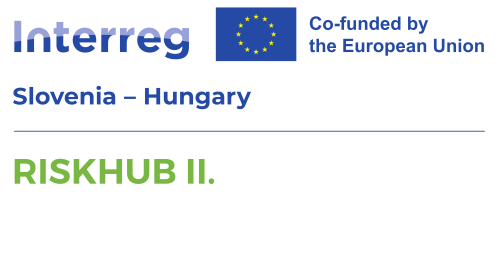
Project title: Reducing Risks by Improving Interoperability between Slovenia and Hungary for Better Preparedness – II.
Project budget (ERDF co-financing): EUR 498.527,68
Project duration: 1. 1. 2024 – 30. 6. 2026
Project Partners: Vas Vármegyei Tűzoltó Szövetség, Budapesti Tűzoltó Szövetség, Zala Megyei Tűzoltó Szövetség, GASILSKA ZVEZA SLOVENIJE, Univerza v Mariboru, Javni zavod Gasilska brigada Maribor, NEMZETSTRATÉGIAI KUTATÓINTÉZET
The aim of the RISKHUB II project is to reduce risks through the development of interoperability between Slovenia and Hungary, improving disaster preparedness and response to climate change-related risks in the Hungarian-Slovenian border towns by improving cooperation between volunteer fire departments and ensuring a sustainable, harmonized preparedness program. Cross-border cooperation is essential to achieve project goals, as disasters and climate change impacts know no borders. Border communities and volunteer fire departments must effectively collaborate and act collectively to face and manage these challenges. The RISKHUB II project enables the sharing of best practices, exchange of experiences and knowledge, as well as the development and implementation of common strategies for more effective risk management. Collaboration serves the safety of people on both sides of the border and helps sustainably develop border areas.
Strategic planning ensures that the project achieves long-term goals, enabling border communities to achieve sustainable development and more effective emergency preparedness. The study on increasing the cooperation and efficiency of Hungarian and Slovenian non-profit rescue organizations helps develop the project’s professional foundations and specific proposals to increase collaboration and efficiency between volunteer fire departments. The study supports communication between volunteer fire departments and other participants, harmonization of different preparedness programs and practices, as well as more efficient and effective collaboration.
The involvement of the academic sector is of great importance, as researchers and experts add value to project planning and implementation. Academics provide volunteer fire departments with their latest scientific findings and technologies to help them manage disasters more effectively and adapt to climate change.
Capacity building is essential to achieve development. As part of this, e-learning and mobile application development, as well as the procurement of specialized equipment, will be carried out. The development of e-learning enables project participants to develop sustainable, harmonized preparedness programs and effectively implement them, thus helping to achieve more effective and stronger emergency response in border regions. The event management mobile application contributes to the success of the project by enabling more efficient and faster communication.
The specialized trailers equipped with firefighting and rescue equipment, as well as flood protection tools, make a significant contribution to the success of the project, as they offer a flexible and mobile solution for emergency management. The vehicle is easily movable and quickly accessible in border areas, allowing for a more effective and rapid response to disasters, which is crucial in emergency management and risk reduction.
To increase the level of preparedness and efficiency of interventions, a harmonized training program is being introduced, including training for trainers, systematic training, and joint exercises. At the operational level of the project, this cooperation leads to the development of more efficient and harmonized firefighting and rescue forces, resulting in more effective and stronger emergency response capabilities.
Community development and information sharing enable the communication of project results and progress to local communities and facilitate relationships between volunteer fire departments, other stakeholders, and local governments. Additionally, it enables the recruitment and involvement of volunteers in the project, contributing to its effectiveness and success.
Source: application form (SIHU00008)
Priority 2 – Inclusive Border Region based on sustainable tourism
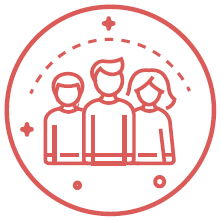
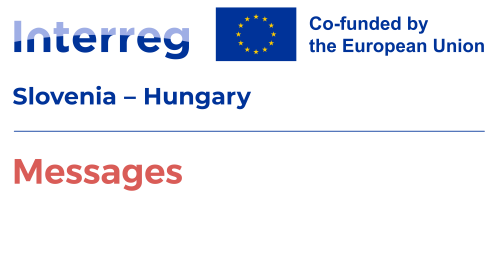
Project title: “Stories not told” – Pilgrimages on the Hungarian-Slovenian border
Project budget (ERDF co-financing): EUR 198.169,00
Project duration: 1. 1. 2024 – 30. 6. 2026
Project Partners: Muraba Európai Területi Társulás, Vas Vármegyei Önkormányzati Hivatal, Občina Lendava
The objective of the project is to strengthen the role of pilgrimage tourism in the border region, survey and connect pilgrimage sites, and create a new pilgrimage route. Our goal is to realize the development of religious tourism, a tourism branch that is growing but is not yet present in the region with sufficient emphasis compared to the conditions.
We intend to connect our new touristic product to the pilgrim routes by processing the tragic life stories of two regionally important historical figures, Blessed Father János Brenner, former priest of the Szombathely Diocese, chaplain of Rábakethely (Szentgotthárd), and Dániel Halász, chaplain of Ljutomer, then Alsólendva, and finally Velika Polana. Their work in the border region, their exemplary life paths and their parallels are suitable for presenting and processing the local events of the underlying historical era, thereby helping to keep the intellectual and historical heritage alive in the border region. We develop solutions to better integrate cultural and intellectual heritage into quality touristic attractions. The lives of the martyrs will be processed in the framework of a research, a border digital inventory will be set up regarding the locations, historical monuments, as well as the regional pilgrimage routes. The results of the research and situation assessment will be presented to the local communities in the framework of a travelling exhibition, thereby increasing the mutual community awareness of the two people (and their historical periods) in the border region.
The project pays special attention to the involvement of the young people and strengthening their connections with the recent history of the border region through the example of two regionally important people; martyrs, whose life stories and examples are particularly suitable for exploring these points of connection by telling specific stories. A camp, a series of creative activities, and a drawing competition will be implemented in a separate work package for the various young age groups. Communication is an important element of the project, its most important target groups are the pilgrims, the pilgrimage tourism organizers, the churches, the regional tourism service providers, as well as the local population. Communication activities appear related to each element of the project, especially conference organization, intensive use of social media, promotional items, involvement of the press, etc. belong to it.
Source: application form (SIHU00012)
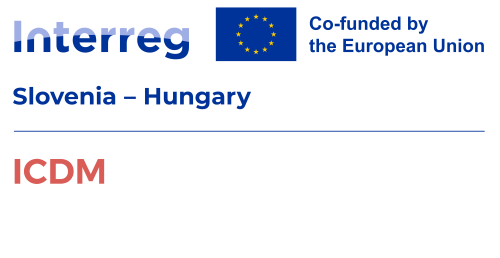
Project title: Development of an innovative cycling destination model in the Slovenian-Hungarian border region
Project budget (ERDF co-financing): EUR 459.251,00
Project duration: 1.1.2024 – 31.12.2026
Project Partners: Zala Vármegye Önkormányzata, Nyugat-Pannon Terület- és Gazdaságfejlesztési Szolgáltató Közhasznú Nonprofit Kft., Zavod za kulturo, turizem in šport Murska Sobota, Znanstveno-raziskovalno središče Bistra Ptuj
In the previous programming period, the IronCurtainCycling project put the Slovenian-Hungarian border region on the EuroVelo cycling routes map. The project partners did this based on the best available practices in trail development – the EV13 Iron Curtain Trail has been signposted, missing infrastructure elements have been built, attractions valorising cultural heritage of the Iron Curtain period have been developed, and service providers along the trail have been identified and trained on cycling friendly services. Building on the partnership of the IronCurtainCycling project and their experience, the Innovative Cycling Destination Model (ICDM) project aims to create a new and innovative destination management model, as no national or regional model has been established and operational neither in Slovenia nor in Hungary so far. The joint participatory model will build on cooperation among local service providers, existing tourism coordinator local offices and other key actors managing attractions and providing services. It will allow to manage the cross-border cycling destination in a sustainable way, allowing vital joint activities after project completion.
In parallel with the implementation of the ICC project, the Amazing AoE project (Danube Transnation Programme) which promotes natural and cultural values of the Mura-Drava-Danube Biosphere Reserve (the world’s first UNESCO Biosphere Reserve in 5 countries) has introduced innovative solutions in the field of tourism marketing and destination management.Both trails (Amazing AoE and ICC) connect the border region with long-distance routes and the trans-European network, the Iron Curtain Trail in a north-south direction, the Amazing AoE in an east-west direction. The ICDM project aims to transfer and adapt these new, already tested participative methodology to the broader Slovenian-Hungarian border area, too. The methodology used and proven in the Amazing AoE will be transferred and adapted in the development of a new cross border tourism product, taking into account the specificities, natural and cultural values of the border region with a special emphasis on “Spirituality”.
In response to the common challenges defined in the SI-HU Interreg Programme 2021-27, in order to utilize synergies between these existing initiatives to develop new cross-border tourism offers, to link and coordinate existing ones as well as involve new, less visited rural areas and their stakeholders in cross-border cycle tourism, while at the same time linking the demand that exists in the popular magnets of the area, the Innovative Cycling Destination Model project aims to create a joint, sustainable framework model for cycling tourism in the cross-border area and to develop a new, thematic cycling product that valorises the common cultural and natural heritage and takes into account the needs of target groups of special needs. The model will include important aspects of efficient joint destination management, such as joint branding, quality management, capacity building, maintenance of trails, joint promotion, etc. applying lessons learned and solutions developed so far.
The challenge of accessibility of tourism destinations (including cycling trails) for target groups of special needs has never been tackled in a coherent manner in the Slovenian-Hungarian cross-border area. Reasons for that are the lack of awareness but also the lack of available working certification methodologies. The ICDM project aims to introduce a European certification standard for accessibility into the common destination.
In addition, there is a significant asset of cultural capital (Built and intangible heritage of Vas and Zala county and Podravje and Pomurje region, archaeological sites, Slovenian folklore, Hungarian poets etc.) and landscape values that are not yet exploited by existing tourism offers, especially in less visited areas. The ICDM project aims to create a new thematic cycling product that capitalises on these assets. One theme in which the area is extremely rich and which could be a key topic and basis of content development and branding is Spirituality – including all the cultural heritage related to different religions, archaeological values, traditions, legends, cultural landscapes and artistic values that represent the historical coexistence of nature and man.
Main outputs of the project:
– create a joint, sustainable framework model for cycling tourism and a promotion strategy for the key local and regional actors, tour operators, touristic offices, local communities
– Training and mentoring of service providers on story-telling of local experiences, how to integrate it into the services as well as their marketing/digital skills.
– create a new thematic cycling product combined with existing supply elements: beneficiaries are the local community, tourists
– cycling-friendly, green and accessible joint quality standard for local and regional actors
Source: application form (SIHU00022)
Priority 3 – Cooperating border region / A better cooperation governance
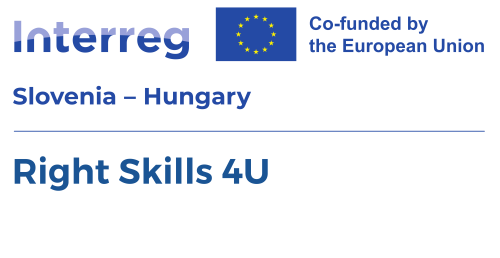
Project title: Skills and abilities in the centre of career orientation
Project budget (ERDF co-financing): EUR 325.906,10
Project duration: 1. 10. 2023 – 30.9.2025
Project Partners: Pomurska gospodarska zbornica, Zala Vármegyei Kereskedelmi és Iparkamara, Območna obrtno-podjetniška zbornica Murska Sobota, Vas Vármegyei Kereskedelmi és Iparkamara, Razvojni center Murska Sobota
The Right Skills 4U can be considered as the continuation of a Right Profession I. and II., as well as Dual Transfer project, however this project focuses on different challenges, than our previous projects. The success of our projects; the topic itself – the vocational training; the excellent cooperation between the project partners; as well as the results of the implemented activities are also proven by the fact that the Dual Transfer project won the European Commission’s Special Award in the Interreg Slam competition for the European Year of Youth in 2022.
As the world, the society and thus the youngsters constantly change, so should the vocational education system adjust to the students both in Hungary and Slovenia. Chambers and other institutions have an important coordinating role in vocational education, so the largest challenge for them is to reach and address youngsters – that they not only hear, but also listen to what is intended for them. The European Commission declared the year 2023 the European Year of Skills, which absolutely supports the thematic of our project. Our aim is to guide our youngsters into the right direction considering the constantly changing labour market needs, to draw their attention to their abilities and skills which should play a crucial role in the career choice. Our long-term goal is to reduce unemployment and by the strengthening and exploiting the suitable competences we can increase the competitiveness of Slovenian and Hungarian SMEs and contribute to the sustainable growth.
The European Commission placed skill development in the centre of the European Union’s policy agenda, aiming to support skill development and acquisition of new skills, as well as the public and private investment in people’s abilities. Our plan is to visit and test the Talentcenter in Graz, and to study the legitimacy of a similar, establish-to-be centre in the Slovenian-Hungarian border region. The founding strategy prepared in the project will present the justification of this career orientation institution. We direct the attention of decisionmakers the presumed positive result of the strategy, and support. The presumed positive outcome of the strategy will be directed to the attention of decisionmakers, and the establishment of a joint, Slovenian-Hungarian, professionally founded career orientation centre will be supported. It is important, that skills are relevant to labour market needs, so we will cooperate also with the enterprises to achieve this. To exploit the opportunities in the labour market, more effective, efficient and inclusive investments in the development of training and vocational education is needed.
With the activities planned in the Right Skills 4U project, we would like to guide the concerned institutions in the establishing and strengthening efficient communication with the youth; as well as we support the career choice that suits the abilities and skills of youngsters. An action plan will be prepared with the involvement of professionals, to highlight those communication forms that can address the young generation. Besides providing relevant information, our primary task is to call youngsters attention to a career choice that is suited for their abilities and skills, since this could be the basis of their professional promotion and balanced future.
Our activities will be achieved by a new and innovative way, utilizing the resources of digital opportunities, giving a new approach to the way of reaching and communicating with youngsters. We want to pay special attention to skills essential for the green and digital transition, as businesses need such workforce.
As a result of our project, we will further strengthen the professional collaboration between the institutions of project partners, the common thinking, and the joint management of problems in the Slovenian-Hungarian border region, as well as the mapping of solution opportunities.
Source: application form (SIHU00006)
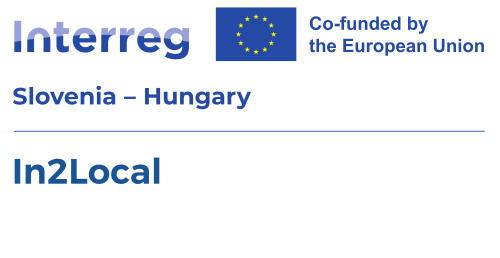
Project title: Establishment of a supportive environment for the introduction of circular economy principles and measures in production processes of local food producers in Pomurje and Vas County
Project budget (ERDF co-financing): EUR 278.374,00
Project duration: 1. 12. 2023 – 30. 11. 2025
Project Partners: Vas Vármegyei Önkormányzati Hivatal, Razvojni center Murska Sobota, Pannon Novum Nyugat-dunántúli Regionális Innovációs Nonprofit Kft, Center za razvoj trajnostne družbe z.o.o.
The above-average level and intensity of the food production and food processing sector in Pomurje and Vas County, is a challenge, and also an opportunity to employ innovative approaches, identify potentials in the regions, and to implement pilot and demo measures for the introduction of circular models of production in the food sector. This will contribute to better utilization of primary raw materials in both regions.
The activities of raising awareness, informing, advising, strengthening competences and transferring good practices will contribute to the increased enforcement of the principles of the circular economy and will encourage sustainable consumer habits. The key deficiency in both regions is low competence and poor education of stakeholders about the principles of the circular economy – both food producers and the supporting environment. This situation is the result of the absence of an adequate support environment with knowledge and skills in both regions that would promote the transition to a circular economy.
The general goal of the In2Local project is to establish such a supportive environment that will enable the introduction of sustainable models of food production and processing in Pomurje and Vas County, based on the principles of a circular economy. The supporting environment will be represented by 4 partner organizations that joined the In2Local project and already have experience in the field of circular economy and are in constant contact with relevant stakeholders. The project partners will map good practices, stakeholders, competences and material flows in Pomurje and Vas County. This will be followed by the preparation of an action plan for establishing a supportive environment with defined goals, activities and a timeline. During the project, the supporting environment will carry out individually designed trainings as part of a mobile living-lab for food producers and processors in both regions, thereby strengthening both the knowledge and skills of the users as well as their own capabilities.
With the aim of strengthening the competences of the support environment itself and the transfer of good practices for the supportive environment, training and study tours will be held through a collaborative approach, which will also have the effect of strengthening ties and trust between partner organizations.
In addition to the mobile living laboratory and trainings, the partners will address the identified challenges with a concrete demonstration of the introduction of a sustainable model in Pomurje and Vas County. The pilot solution will represent a model of data collection and exchange on production by-products, surplus stock and end-of-life products, and will connect surplus raw materials and semi-finished products with processors who will use these substances in their production and processing processes, thereby ensuring higher resource utilization and materially completed flows.
The supportive environment, which will be represented by all 4 partner organizations of the project and which will strengthen awareness and educate stakeholders in the field of circular economy, does not yet exist in the cross-border region and will be completely new with the described approach.
Source: application form (SIHU00007)
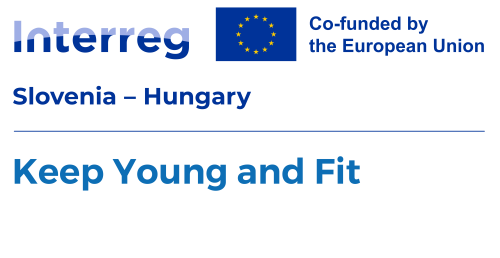
Project title: Preparation and implementation of pilot measures for the gradual elimination of the causes of the poor health status of young people in the cross-border area.
Project budget (ERDF co-financing): EUR 299.940.30
Project duration: 1.1.2024 – 31.12.2025
Project Partners: Projektna razvojna agencija in komunikacija d.o.o., Zalaegerszegi Televízió és Rádió Kft., Zdravstveni dom Gornja Radgona, Lenti Város Önkormányzata, Alma Mater Europaea – Evropski Center, Maribor, Magyar Agrár- és Élettudományi Egyetem
The rapid development of technology over the last 50 years has fundamentally changed many patterns of behaviour. First television and radio, then computers, video games, tablets and mobile phones, which have become affordable to everyone, have revolutionised the way we spend our leisure time. It is no longer spent actively, in nature or playing or socialising with peers, but in isolation, sitting for hours watching TV, listening to music or playing games. Industrialisation and urbanisation have played their part: the proportion of the population living in rural areas declined rapidly after World War Two, as did the number of children in families. Growing food used to be a long and arduous process, involving virtually the whole family. But industrial methods of food production and processing, and the development of transport and marketing networks, have made food accessible and cheap. In order to make more money, food and drink manufacturers and sellers began to produce or sell highly sweetened and otherwise high-calorie foods, realising that humans find it hard to resist them, as it is a natural characteristic of our bodies to want to survive, which requires calorie-dense foods. If we add to this the development of the chemical industry, which has been instrumental in the development of preservatives, flavour enhancers and pre-prepared foods, then we have in fact already listed most of the reasons why the situation among young people is as it is today: we have, in most EU countries, a very high proportion of children in their teens who are unable to run 600 m and who are 10 or more kg over the recommended body weight.
The assessment that the dietary and physical activity habits of young people (and not only young people) are disastrous is, unfortunately, not exaggerated. The national institutions responsible for these issues have come to the same conclusion and have also taken a number of systemic measures to at least curb, if not reverse, these trends. Systems to tackle obesity and poor dietary and physical activity habits among young people and other target groups are already in place, but in many places, they are not delivering the right results or are inadequate and need to be strengthened and supplemented. Slovenia and Hungary are no exceptions, and according to the latest statistics, they are more at the negative end of the EU ranking on these parameters. A joint and coordinated approach to these issues by the Slovenian and Hungarian institutions involved in this project can play an important role, or potentially have a greater impact than without cooperation. The cooperation will be based on an agreement between the partners, which will then serve as a basis for the creation of a group of experts from the partner organisations, whose first task will be to develop a joint strategy with an action plan to tackle the causes of poor physical health among young people in a step-by-step manner. The plan will be tested on a pilot basis in areas where some of the measures to improve the physical well-being of primary school pupils will be implemented: healthier snacks in schools, health days, self-testing, sports activities, etc. The results of the actions will be analysed and, on the basis on that, a special handbook will be produced to summarise the positive aspects of the strategy and action plan in a shorter, more usable format. Its use will be offered to health promotion centres, schools, municipalities and other stakeholders. The expert group will also include representatives of two higher education institutions that will implement the student part of the strategy in their curricula through the introduction of a jointly planned new elective course. Experts from both institutions will be involved in its implementation. The new university course will add value to the project, as will the cooperation of two media companies which, like the faculties, will work together on an inter- institutional basis to produce a series and joint programmes on the subject. The programmes will be broadcast on their channels and will also be offered to other TV stations in the programme area. The importance and role of the media in effectively reaching target audiences is often neglected when addressing this type of issue. Important stakeholders include local, regional and national decision-makers, to whom the handbook will be presented in special presentations. In this context, the offer of mentoring in the implementation of the handbook by experts from the expert group will be highlighted as another option. In addition, two high-profile conferences will be held where experts will present the strategy and open the floor to stakeholders to review or update it.
Thus, the main objective of the project is to complement the existing youth health prevention systems in the programme area in order to make them more effective.
Source: application form (SIHU00009)
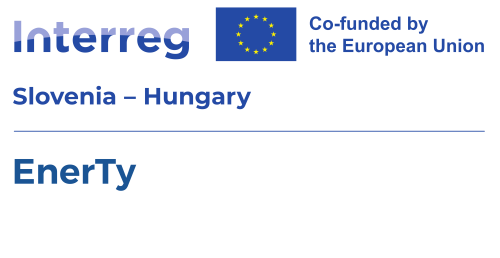
Project title: Cross-border efforts to prevent and eliminate energy poverty
Project budget (ERDF co-financing): EUR 333.288,00
Project duration: 1.12.2023 – 30.11.2025
Project Partners: Lokalna energetska agencija za Pomurje, E-zavod, Zavod za projektno svetovanje, raziskovanje in celovite razvojne rešitve, IMRO-DDKK Nonprofit Kft., Nyugat-Pannon Terület- és Gazdaságfejlesztési Szolgáltató Közhasznú Nonprofit Kft.
The common challenge addressed by the project through cross-border cooperation is to improve the knowledge and awareness of decision-makers, and to increase cooperation between decision-makers and the end users, in the field of prevention and elimination of household energy poverty. Around 13% of households in the programme area face energy poverty, consequently linking energy poverty to the risk of social exclusion. The programme area has also recently experienced a rise in energy prices, which further contributes to the problem of citizen’s energy poverty. Therefore, it is necessary to establish a realistic baseline and solutions for energy poverty: to obtain data on the ground and to identify the level of households already experiencing energy poverty and the level of those who will soon experience energy poverty. Energy poverty is a multidimensional problem and important challenge, which needs to be addressed by the key actors and decision-makers who can take concrete action. On the other hand, it is necessary to provide them with a starting point for action and to indicate possible solutions.
The project will contribute to reducing energy poverty through activities aimed at improving energy efficiency and the use of renewable energy sources in households. The results will be reflected in lower energy consumption, energy efficiency and better exploitation of the endogenous potentials of local energy sources and ultimately lower CO2 emissions. The concept, including an action plan involves the socially vulnerable and disadvantaged groups in the programme area who at biggest risk of energy poverty. A bottom-up initiative will be created, different approaches will be tested, and baselines and commitments will be prepared to fight household energy poverty in a coordinated way.
The EnerTy project brings together four partners, each responsible for implementing activities in their own region. The partners have in-house know-how and competences from previous participation in the Interreg SI-HU “Green Line” project. At the end of the “Green Line” project, partners signed a long-term cooperation protocol to improve the level of sustainable energy in the whole cross-border cooperation area between Slovenia and Hungary. Recently partners have noticed that the problems and challenges related to energy poverty in all regions of the programme area are very problematic, especially after Ukraine war culminated in raised energy prices. The fact is that the partners are familiar with the area, but we do not have all the data on the situation, and we do not have collected examples of good practices, policies, and instruments that we can provide through the cooperation in the project. The lead partner has already carried out energy audits in the field and has some data for the Slovenian part of the region, while the Hungarian partners will carry out energy audits in households in the framework of the project, thus providing part of the input data for the analysis and demonstration of the situation of vulnerability to energy poverty. All partners will contact key organisations in the regions that can provide project with the missing data. We will develop a methodology to carry out these activities and finally prepare a comparative analysis of the situation. In the second work package, we will prepare an overview of good approaches and instruments and policy guidance. The concept of prevention and eradication of energy poverty with recommendations for the cross-border region SI HU, will be the basis for cooperation, the substantive orientation of the work and the framework that will define potential organisations. An important part of this document will be the identification and proposed actions to tackle and prevent energy poverty. This will also be a base for drawing on the contents to be covered and mastered by the protocols. The organisations will sign the Protocols of visibility and commitment to actions to reduce energy poverty. The signatories, such as decision-makers at local, regional, and national level, and other key organisations with an impact on the field of energy poverty, will ensure that the project has a lasting impact on the programme area and its population after its implementation. A cross-border group of organisations will be formed, whose long-term cooperation will focus on monitoring the implementation of the protocols and cross-border monitoring of policy changes and new instruments. The content of the cooperation, if relevant and necessary, will be built upon through cooperation and/or involvement in EU project initiatives. The added value of the project will be to ensure a reduced level of energy poverty, especially in the less developed regions of Slovenia and Hungary.
Source: application form (SIHU00047)
Priority 3 – Cooperating border region / Build up mutual trust, in particular by encouraging people-to-people actions
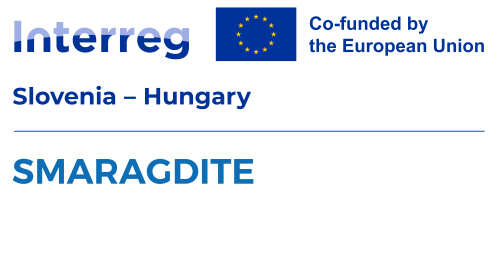
Project title: SMARt, Green and DigiTal Education
Project budget (ERDF co-financing): EUR 20.845,00
Project duration: 1.1.2025 – 31.12.2025
Project Partners: Pomurska gospodarska zbornica, Zala Vármegyei Kereskedelmi és Iparkamara
The Chamber of Commerce and Industry of Zala County and the Pomurje Chamber of Commerce and Industry have been cooperating effectively for more than a decade on the field of economic development and vocational training, and their activities have a positive impact on the economy of the Slovenian-Hungarian border region. The economy is facing constantly evolving challenges, which can only be met if the economy can react quickly and effectively to the changed business, digital, environmental and labour market conditions. On the basis of this, our project aims at the shaping the attitude of youngsters, focusing on continuous compliance with current digital and sustainability professional expectations, the importance of lifelong learning, flexibility, resilience and the acquisition of digital and green skills. The European Commission has put skills development at the centre of the EU policy agenda, aiming to support the development of existing skills and the acquisition of new skills, as well as public and private investment in people’s skills. This way, we want to support young people in the border region so that they are able to build a career in their domestic environment, contributing to the development of the region.
The SMARAGDITE project aims to organise two major events in Pomurje and Zala county, focusing on businesses in the tourism and construction sectors as well as on the students as future employees. The events, called the Festival of Professions, will allow these two target groups to meet and interact in a relaxed, informal festival atmosphere, which will support the development of closer interactions. At the jointly organized Slovenian-Hungarian events, besides the professional programmes, the innovative green and digital solutions will be presented for youngsters at professional stations- so called ‘profession islands’, which draws the attention of the young people. In addition, we organize professional competitions related to the given sector for the participating Hungarian and Slovenian students. In order to connect generations within the given sectors, we will look back at how tourism and construction activities, tools and expectations have evolved and developed and how traditional best practices and procedures can be used in the modern age. Our plans include to make the Festival of Professions the largest Slovenian-Hungarian professional event in the border region. We aim to achieve our activities in a new and innovative way, utilizing the resources of digital opportunities, paying special attention to the skills essential for the green and digital transition, since this kind of workforce is what businesses need the most. As a result of our project, we will further strengthen the professional cooperation between the institutions of the project partners, think together, jointly address the problems and identify the solutions in the Slovenian-Hungarian border region.
Source: application form (SIHU00058)
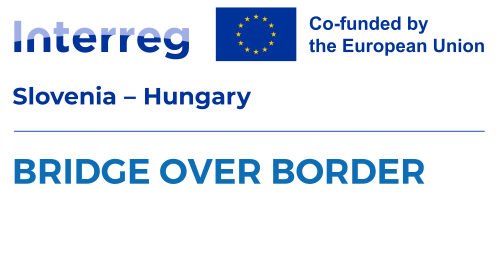
Project title: Establishing and strengthening the bridge community in the cross-border area
Project budget (ERDF co-financing): EUR 22.375,00
Project duration: 1.5.2024 – 30.4.2025
Project Partners: ZSR – zavod za socialni razvoj Murska Sobota, so.p., Nagykanizsai Bridzs Sportegyesület
Bridge is a mind sport that, like chess, is recognized by the International Olympic Committee and is currently played by more than 60 million people worldwide. In some parts of Europe, bridge is taught in schools. Many studies show that the performance of bridge students/players has improved in many subjects. From 1 October 2022, bridge is also a subject at the Faculty of Mathematics and Physics of the University of Ljubljana and carries 3 ECTS points and is currently attended by 32 participants, which is the maximum expected number of students. Bridge is a complex card game that requires two pairs of players. The point of the game is to establish a “bridge” between two partners – teammates, who agree on the strategy of the game with the help of the rules of the game and non-verbal communication. Bridge teaches us logical thinking, tolerance, patience, persistence, cooperation, empathy, honesty, and encourages us to research, seek additional knowledge, and be oriented toward success. Through playing bridge, there is spontaneous interaction between the young and the elderly, and thus intergenerational cooperation. All our neighbors, including Slovenia, have slightly more than 25,000 registered bridge players, in Slovenia and Hungary there are 618 of us. These are only those players who go to tournaments and pay membership fees in clubs. There are many more amateur players. As we note that more and more seniors (over 60 years old) and fewer juniors (up to 30 years old) play in clubs, we want to contribute to the popularization of bridge, especially among young people, through project activities, as it offers significantly more useful and quality leisure time than playing with IT devices. We want to establish a cross-border bridge community that will successfully cooperate for many years after the project and will successfully organize cross-border bridge tournaments in an unforgettable environment with excellent local tourism offers – accommodation, cuisine, winemaking, handicrafts, experiences, natural and cultural heritage,…
The purpose of the project is:
– public awareness of the positive effects of playing bridge on the health of the elderly (memory, dementia, Alzheimer’s) and the development of young people (cognitive development, social skills) and the animation of new players;
– for this we will use all possible channels with all partners – press conference, bilingual information leaflets, fB, websites of partners and the Interreg program, announcements to journalists,…
-animation activities in high schools and universities and the implementation of free bridge courses for interested (young) players in Pomurje and Zala County;
– strengthening intergenerational cooperation;
– informing about the fun and challenge of the game, which is available to everyone for a small fee, and presenting the game through project activities;
– socializing and getting to know people – bridge players across the border between Slovenia and Hungary and beyond;
– in-depth cross-border cooperation between clubs; and last but not least
– competition – organization of 4 tournaments (with a total of at least 250 participants) in the cross-border area of Slovenia and Hungary –
With this, we want to show local (tourist) providers on both sides of the border the opportunity to promote, participate and include their offer in cross-border bridge events.
Source: application form (SIHU00063)
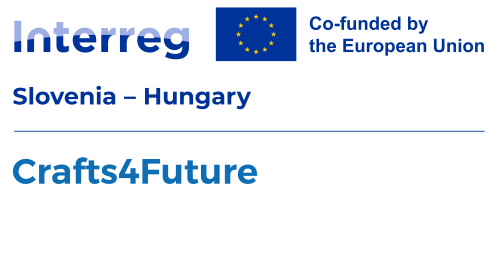
Project title: Preserving handicraft heritage in the border area of Slovenia and Hungary
Project budget (ERDF co-financing): EUR 14.687,50
Project duration: 1.3.2024 – 30.6.2024
Project Partners: Pomelaj, zadruga za razvoj podeželja, z.o.o, Vasvári Nagytérségi Népfőiskoláért Alapítvány
The Crafts4Future project, through the cross-border cooperation of the project partners Pomelaj and VNNA, primarily addresses the challenge of the poorer networking of craftsmen and craftswomen in the cross-border area, who are facing the challenges of the emigration of people from rural areas, the disappearance of craft heritage, crafts, and entrepreneurship in the area, language barriers, the attractiveness of the area, and the following of trends and the inclusion of socially deprived groups in the work and activities. The aim of the project is to lay the foundations for long-term institutional cooperation and confidence building in the cross-border area of Slovenia and Hungary through seven workshops in the field of handicrafts, introducing innovative approaches to the preservation of cultural heritage. Given the current situation in the labor market, we want to raise young people’s awareness of the need to nurture culture and cultural heritage, which will be very important in the future, given the trends of mass sales, rising prices, and increasing negative environmental impacts. The workshops will be based on a mentoring approach, except for the first workshop, which will bring together local craftspeople from the Pomurje region and the counties of Vas and Zala, with the aim of developing a strategy for the implementation of further activities, even after the end of the project. The main impact indicators are 6 organizations working together across borders in the field of culture, heritage, and handicrafts and 7 jointly organized cross-border events on handicraft heritage preservation for young people. The participation of the organizations and the organization of the workshops/events will benefit the project partners, as well as all other stakeholders involved in the project, and the general public, which will be reached through various communication tools and channels. The main target group is craftsmen and young people, in whom we see potential and development. The benefit will also be reflected in increased awareness of the target groups and in the attractiveness of the cross-border region. Institutions linking craftspeople from both sides of the border face the same challenges of what was once a common area. Handicraft in the area has the same foundations, while certain practices have progressed more in one country than in the other and vice versa. This is why the need for cross-border cooperation is even greater and shows good potential for the development of the area, with the support of organizations that have the know-how and experience to take handicrafts to the next level. The project will use different approaches to preserving cultural heritage and handicrafts in a way that follows trends and innovative approaches in the sector, such as the use of environmentally friendly materials, reused materials, fashion trends, the inclusion and employment of socially disadvantaged people, different ways of organizing events and workshops in the field, the involvement of influencers in the activities and so on. These are all practices that show the originality of cross-border cooperation and where one of them has not been used before in the cross-border area.
Source: application form (SIHU00071)
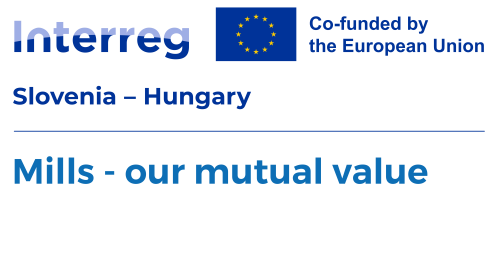
Project title: Joint activities to preserve the tradition of mills and milling in the SI-HU cross-border area
Project budget (ERDF co-financing): EUR 20.800,00
Project duration: 15.2.2024 – 14.9.2024
Project Partners: Zavod Multimedija Panonija-MMP zavod za informiranje in obveščanje okolja, Cven; BABIČEV MLIN NA MURI – zavod za ohranjanje, razvoj in promocijo Babičevega mlina na Muri, Veržej; Csörötneki Ifjúsági Kulturális Egyesület
The Mills – our mutual value project responds first and foremost to the challenge of the acute lack of appropriate solutions that would save one of the most important elements of rural tradition and immovable cultural heritage of the two regions included in the project, i.e. mills and milling industry, from their slow decay and disappearance. The challenge is not local, nor regional, nor only Slovenian or Hungarian, but is generally present in the rapidly changing rural area of modern Europe. This cross-border project therefore addresses only part of a much more complex problem, but through it, for the first time, solutions are offered that have not been seen in this area until now: the cross-border integration of Slovenian and Hungarian non-governmental organizations in the field of preserving the tradition of milling through organization and implementation of attention-grabbing public events along the Mura and Raba River. With these events, members of the target groups and the widest possible public will be addressed in the sense of finding answers to the question of the meaning of the continued existence of mills, and in doing so, they will put in the forefront the role of these mills, which they can already play today, and even more so in the future, in the field of food self-sufficiency, sustainable energy use, preservation of the common cultural and technical heritage and preservation of the internal social relations that were characteristic for the life of the inhabitants who lived with and next to the mills. The story created by this project is particularly interesting because it includes some of the most representative mills on both sides of the border: the last functioning river mill on the Mura River and the once very important mill on the Raba River; but at the same time also because this project installs the indispensable role that the cross-border non-governmental local initiative of three partners is ready to assume in popularizing and re-evaluating the heritage of milling on these two rivers. The concrete results of the project are operationally distributed among the set of output indicators. The first indicator refers to solving the initial problem of the entire project, which is the lack of interested actors or stakeholders who would be willing to invest their time and human resources in finding the best ways to permanently ensure the continued existence of mills as objects of cultural and technical heritage in the future. The second indicator refers to demonstrating the effectiveness of public events at these mills for their popularization, as one of the possible ways to achieve the aforementioned goal. Both events, which will take place in the period between May and September 2024, combine the same concept, according to which the program will first include the performance of an panel of experts with guests speakers (ethnologists, conservators of cultural heritage, mill operators, etc.), followed by the cultural section of the programme with the participation of local and gust dancing and other folklore groups (3+2). The accompanying program will consist of the opening of an exhibition of award-winning works of art by children and youth on the theme of the tradition of milling (30 works), a presentation and signed joint petitions for the preservation of mills, and a culinary competition (bread, langash). Local suppliers will also be throughout present at the venue with their stands (10+10). Altogether, at least 500 visitors from Slovenia and Hungary will be present at both events.
Source: application form (SIHU00072)
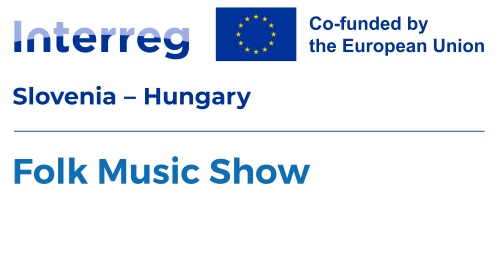
Project title: Common folk music – joint performances
Project budget (ERDF co-financing): EUR 20.312,50
Project duration: 1.4.2024 – 30.9.2024
Project Partners: “HUMÁN ESÉLY” Tanácsadó Nonprofit Közhasznú Korlátolt Felelősségű Társaság, Javni zavod za turizem kulturo in šport Beltinci
Folk music of the Muravian region is a common cultural heritage of the border region, which should be treated as a whole on both sides of the border. The common cultural heritage becomes truly common when the receptive audience hears Slovenian and Hungarian folk songs side by side, coming from the same source. The project will showcase the authentic folk music of Muravian and Zala counties, with the participation of folk ensembles, folk music schools and amateur folk music choirs from both countries. In Beltinci, the region’s 3 folk music ensembles and the folk ensemble of Beltinci Music School will perform at the public folk music performance organised by ZTKS Beltinci (PP2). A special feature of the Beltinci Music School is that it is the only school in Slovenia with a cimbalom program. At least 1 Hungarian guest ensemble or choir, Hungarian folk music ensembles and the folk music teachers of Liszt Ferenc Primary School in Zalaegerszeg (in Zala County, folk music is taught at this school as part of the music program) will participate in the performance. At the public folk music performance organised by the Humán Esély Nonprofit Kft. (LP1) in Zalaegerszeg, 3 folk music ensembles and choirs from Zala County and the “small and large choir” consisting of students from Liszt Ferenc Primary School in Zalaegerszeg will perform folk song collections from Zala County and the Muravian region. In addition, they will perform folk songs from the collections of Sr. Károly Horváth, József Vajda and Antal Pungor, and folk songs from the Slovenian collections with common Hungarian and Slovenian roots, entitled “Akkor táncol a medve”. At this performance, at least 1 Slovenian guest ensemble and representatives of the Hungarian and Slovenian partners will participate. We will create a press release for the local and regional press describing the objectives and expected results of the project and the programme of the folk music performances. Representatives of the press will be invited to the events. We will help promote the programme and the project by creating a bilingual Facebook page and communicating about project events. On the social media page, previews, announcements and photo coverages of each programme will be available. Also, addresses and contact details will be provided for folk music performers in the programme area to contact the performing groups and project partners.
Source: application form (SIHU00075)
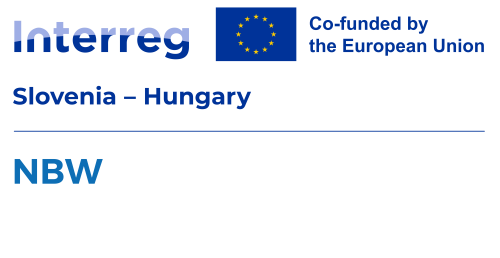
Project title: No border words
Project budget (ERDF co-financing): EUR 25.000,00
Project duration: 1.3.2024 – 30.9.2024
Project Partners: Kulturni center Maribor so.p., Őri Alapítvány
The project deals with the common challenge of promoting mutual understanding and cooperation in the border region. The partners create the NO BORDER WORDS project to strengthen mutual cooperation across borders. In the age when wars are raging on the external borders of Europe and fences are being built on the internal borders, cross-border cooperation is not only topical, but also becoming a necessary topic of everyday thought and practice.
The Maribor Cultural Center has thirty years of experience in this type of relationship, having organized international music festivals such as Rock at the border and No Border Jam since the 1990s. This time we are expanding our activities to other areas, as our rich experience has taught us that art and artistic co-creation and exchanges create strong and lasting bonds between different linguistic, ethnic, and national communities. Since the meaning is above the language, the words do not stop at the border of the languages, in principle there is no obstacle for them to reach anyone. Good translators help people living in different linguistic environments to overcome language barriers. Their role is important, because only with the help of good translations can we get to know the meaning of the words and the person speaking in the communication. Although progress has been made in the field of Slovenian-Hungarian cultural exchanges, we still feel a certain lack, especially in the field of living, contemporary literature, especially among authors who do not yet have wider, regional (Central European, Visegrád, Balkan) recognition. With the NO BORDER WORDS project, we would like to create the first personal and institutional contacts and open the possibility for wider cooperation in the future. The project is implemented through joint events, actions and events, and includes meetings of literary and musical creators, introducing their works to publishers, workshops, the possibility of art exhibitions and joint works, media appearance (e.g., SI.TV AV). Planning and conducting joint events, making new works, joint creative work is a new, creative activity that becomes a permanent form of cooperation. We encourage regular literary translation practice, implement projects of joint works, and increase the number of published works. We actively connect writers, poets, and musicians to create new joint productions. Co-production responds to the challenges faced by creators, publishers, and the creative sector of the entire area. The production conditions are similar and somewhat typical of border areas. We turn shortcomings into opportunities and into plans and realizations of new productions. The cooperation enables greater publicity, which is also supported by the positive public attention directed at the border region and makes it a little easier to assert yourself creatively in the wider European area.
Source: application form (SIHU00091)
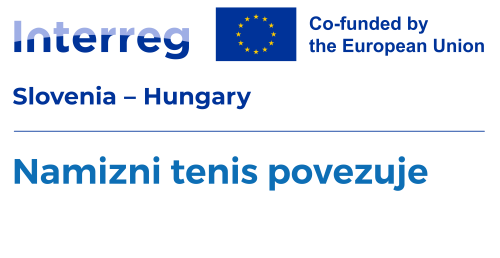
Project title: Table tennis is a universal language that connects all age groups and is understandable to everyone
Project budget (ERDF co-financing): EUR 25.000,00
Project duration: 1.2.2024 – 30.9.2024
Project Partners: Namiznoteniški klub Sobota, Murska Sobota; Szombathely Asztalitenisz Kör
Cooperation between clubs is crucial for promotion. Until now, we have successfully cooperated with clubs all over Slovenia, but we have not yet carried out such cooperation with clubs from abroad. Our partner, the Table Tennis Club from Szombathely, also cooperates with clubs from Hungary, and they are looking forward to cooperating with a club from abroad, as such cooperation will have a great effect on all participants. Every coach has his own view on the development of players, and the more eyes he sees, the greater the chance tow eliminate all mistakes and to enable each individual to develop maximally as a table tennis player. Upgrading, becoming a top player requires time, talent, work and quality professionals. Therefore, this collaboration will be between two clubs with a long tradition it has borne fruit and with our joint efforts we will help to eliminate the mistakes of the players and enable them, with the cooperation of the coaches from both clubs, also to advance. All participants will benefit the most, as friendships will be forged during joint trainings, lectures and moments spent together at lunches or dinners and free time after all the daily activities. We will also involve the parents of children and young people, so that during the training of the children, the parents will be able to meet and build friendships, which would be more than excellent for everyone. In addition to the exchange of coaches; experiences and the advancement of players, this is one of the main ways to establish contacts with all participants and to make cooperation at all levels permanent. The integration plan is such that we will go from Murska Sobota to Szombathely once every month, from October 2023 to May 2024, where we will do a longer joint training, have various professional lectures on sports, nutrition and general etiquette. Also, friends from Szombathely will come to Murska Sobota once a month, where identical activities will take place. In the meantime, we will hang out for two days, depending on the competition calendars in both countries, as both clubs have a lot of competitions in different age categories throughout the season and there are still a lot of league matches, so coordination will also be necessary, but we will do it with our combined strength and with the goal that we will all have something from it, we succeeded. At the first and last meeting we will play matches in different age categories, in August 2023 they will take part in the 53rd open championship of Murska Sobota – the 8th memorial of Mirko Unger and we will take part in one of their competitions, the dates will be given in September 2023. The cooperation will enable a broader vision for the coaches in both clubs, how their children and also the elderly could eliminate possible mistakes in the technical sense of the shots, in the technique of movement at the table and with common ideas, and different approaches to eliminate them. Through joint trainings, exchanges of experience and cooperation, all stakeholders will have the opportunity to progress by eliminating errors in the current game. Children will get to know their peers, as well as the youth and, of course, the membership drive will get to know each other and mix experiences. In our club, we also work with disabled people and we will include them in some kind of training, as well as we have established the first contacts with people with Parkinsons disease and we will also enable these people to participate in some way. We expect a lot from veterans and recreationists, because both in Pomurje and in the Vas region, there are a lot of such dedicated people, and they will have the opportunity to get to know each other, make contacts and maybe even make business connections, because among them there are a lot of craftsmen and people in various companies, where is the possibility of cooperation then it can also be permanent and thus an additional effect can be achieved, which would be something new and original, that through sport people establish business cooperation, and maybe someone also falls in love…so there can be a lot of potential positive effects from sports cooperation , establishing contacts, long-term cooperation in several areas and even a wedding in a few years is not excluded. Why not hang out when we live so close but dont know each other and the only common language is table tennis and a really nice collaboration can develop from that. The language of communication will be English or German from the beginning, lectures will be translated from Slovenian to Hungarian and vice versa. We are looking forward to the cooperation of two successful table tennis clubs and cheerful and happy people spent in joint activities both in Slovenia and in Hungary. Thanks for the opportunity and well be happy to do whatever it takes to make sure everyone gets something out of this project.
Source: application form (SIHU00096)
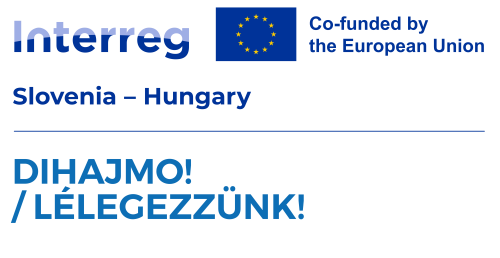
Project title: LET’S BREATH TOGETHER!
Project budget (ERDF co-financing): EUR 20.800,00
Project duration: 1.3.2024 – 31.8.2024
Project Partners: OBČINA SELNICA OB DRAVI, Zalakaros Város Önkormányzata
Cross-border cooperation between institutions and civil society, ignorance of the language and low involvement of civil society of all generations in the planning and implementation of activities to ensure sustainable – green and all-inclusive development of local communities – are common challenges that we solve in the BREATHE project.
There are similarities between the two municipalities, which is why we decided to apply for the project. We designed the project together; it is managed by a joint project group. Both municipalities have approximately the same population. The two municipal administrations are similar in terms of organizational structure and actively cooperate with primary schools. There is a low level of industrialization in both municipalities. We both face the aging of the population and the desire for green and natural development. Without the active participation of civil society, the sustainable development of society cannot happen. Therefore, the exchange of knowledge and good practices is important for both municipalities. The goal of the project “BREATHE” is to establish the foundations and strengthen the connection and trust for long-term cooperation between municipal leaders as driving forces of development in municipalities. With two meetings in both municipalities, we want to establish active cooperation and personal contact between employees and enable them to exchange good practices. Content-wise, the two municipalities complement each other in terms of knowledge and experience: the Municipality of Selnica ob Drava actively works to reduce its carbon footprint, has a strategy of ensuring a healthy life for its citizens and nature by supporting sustainable consumption and the reduction and reuse of waste, as well as promoting well-being for all generations without any discrimination based on gender and age, the Municipality of Zalakaros excels in the realization of major EU projects of sustainable and green development. Civil society (tourist association, pensioners’ association, sports associations, cultural and artistic association…) will get help in establishing contacts, which will gain new acquaintances, knowledge through the exchange of experiences, establish interpersonal trust and open the way for possible joint projects within the framework of bilateral meetings. Participating schools with students and teachers will build trust and cooperation also through digital methods of simultaneous translation. The last expected change will be at the level of the general public, who will have the opportunity to educate and raise awareness about sustainable living and tourism at a public event, as well as get to know cross-border municipalities, thereby lowering the remaining border, which is constantly caused by the large difference between the two languages. Our main result will be two (one in each municipality) all-day content-structured events: LET’S BREATHE WITH SELNICA OB DRAVI and LET’S BREATHE WITH ZALAKAROS, which will be public. Representatives of both municipal administrations, civil society (associations and non-governmental organizations), primary schools, students and the general public will participate in both events. In the morning, there will be a presentation of the host municipality and meetings of municipal leaders, associations and non-governmental organizations and schools, as well as a workshop on the use of information and communication technologies (digital translators) for students. In the afternoon, there will be joint sports activities, a public presentation of the guest municipality with a cultural program and a fair of sustainable products with tasting of local products and presentation of the tourist offer. The presentation of the parterres and their civil society at the sustainability fair will enable the tourism-developed Zalakaros to have excellent promotion and increase the visibility of the place to the general public in the partner municipality. Sustainable products from Selnica ob Dravi will increase their visibility and market potential. The partners will also sign an Agreement on cooperation in the fields of economy, culture, and sports, which will be the strategic framework for further mutual cooperation. The representatives of elementary schools will sign the Cooperation Agreement as the first step towards regular exchanges of knowledge and visits, as well as opportunities to participate in international projects. The BREATHE project provides an innovative approach to the development of cross-border cooperation between institutions and civil society in the fields of economy, culture and sports, including the topics of green development and digitization. The project will develop an innovative way of establishing intergenerational and intersocietal cooperation and building trust for smaller municipalities, where both institutions and civil society have less knowledge and experience for cross-border integration.
Source: application form (SIHU00098)
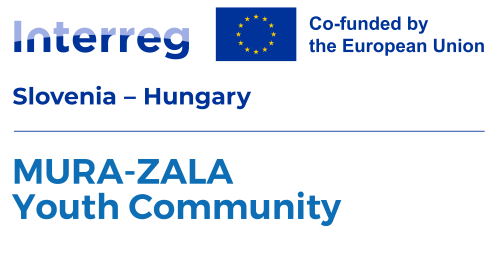
Project title: MURA-ZALA Youth Community
Project budget (ERDF co-financing): EUR 20.725,00
Project duration: 1.4.2024 – 31.3.2025
Project Partners: Zalaegerszegi Gazdasági, Informatikai, Műszaki Képzésekért Alapítvány, Pomursko madžarsko mladinsko društvo – Muravidéki Magyar Ifjúsági Szervezet, OBČINA LENDAVA – LENDVA KÖZSEG
The MURA-ZALA Youth Community Project aims at the development of mutual trust among three collaborating partners. The Zalaegerszeg Foundation for Economic, IT, and Technical Training (ZKA) as lead partner on the Hungarian side and the Hungarian Youth Organization of the Mura Region (MMISZ) and the Municipality of Lendava on the Slovenian side implement cross-border and cross-regional series of programs. The partners will make a long-term commitment to help young people (secondary school and higher education students) stay in the area after graduation and to help them find their career paths, thus reducing emigration from Zala County and the Pomurska region. The project partners will sign a cooperation agreement committing themselves to raising skills levels in the two regions, which could also form the basis for a standard project. The goal of the project is to create a partnership of three collaborating organizations and thus ensure the long-term successful completion of its overall objectives. Through the programs, three cooperating organizations will promote mutual cooperation and understanding between more than 60 target group participants from Slovenia and Hungary. In order to achieve the set objectives, three events will take place during the program period, in the two countries: the Leaders’ Workshop in Lendva Municipality, co-organised by MMISZ and ZKA, Youth Camp Zalaegerszeg, co-organised by ZKA and MMISZ, and Youth Camp Lendava, co-organised by MMISZ and ZKA. During the Leadership Workshop, participants will learn about both the Slovenian and Hungarian secondary and higher education systems, their positive aspects and good practices, which they can later use in the appropriate advocacy and professional forums. Both the ZKA and the MMISZ undertake to organize three-day camps for the target group, which respond to the arising problems and areas for improvement with professional programs. In the youth camps, the participants can learn about each other’s culture, sustainable development, the dangers of online space, good practices in the context of digital self-protection, among others, in the framework of thematic professional days (Carrier Day, Sustainability Day, Innovation Day), learn about the study programs offered by the University of Pannonia campus in Zalaegerszeg, career paths after entering the labour market, career opportunities, sports activities and a range of activities to showcase innovation opportunities in both industry and higher education in the field of training. Youth Camp Lendava offers three themed days (Cultural Day, Traditional and Sports Day, Carrier Day) where participants can learn about each other’s culture, industrial environment, folk traditions and sports. The aim of the cooperation is also to enable the students, after completing their secondary education, to study at a higher education institution that offers them both the type of education and the relevant professional skills, thus reducing the outward migration to larger cities and the capital. The mutual trust between the project partners helps to further joint thinking, identify future problems of the target group, and act together after joint thinking, to solve problems, and to lay the foundations for a future large-scale project. During the project, young Slovenians and Hungarians will learn about the opportunities offered by higher education institutions on both sides of the border, as well as about cultural values and good practices and solutions to sustainability problems. So far, local activities have only achieved local objectives. The project offers an opportunity to learn from each other’s good practices and to use them together to achieve further objectives as a basis for future joint projects. Young people’s shared camps and experiences along the border create a strong sense of cohesion and promote the interoperability of secondary and tertiary education systems in cooperation between the two countries. Students, teachers, and administrators from both countries will learn about each other’s education systems and cultures, as well as their cultural, social and sustainability values through the secondary and university education systems. The proximity of the border makes it possible to build a career in practical education in the fields of economics, IT, technology and engineering among the companies and enterprises on the dual training partner list of the Zalaegerszeg campus. At the same time, they would stay close while still remaining close to where you live. An innovative element is that the project aims to make it easier to transfer secondary and higher education courses between the two countries.
Source: application form (SIHU00102)
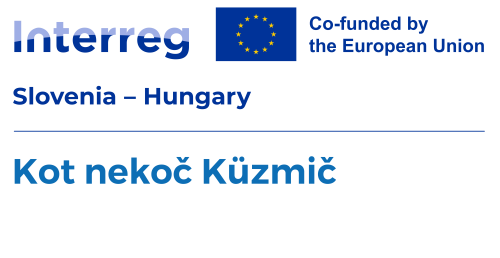
Project title: As once Küzmič – Let’s connect the former common cultural space today
Project budget (ERDF co-financing): EUR 20.312,50
Project duration: 1.9.2024 – 31.10.2024
Project Partners: Razvojni zavod Občine Puconci, Szakonyfalu Község Önkormányzata
Today’s geographical area, where Porabian Slovenes live today, and the area of Prekmurje were a common area before World War II. The inhabitants there, in the territory between Mura and Raba, developed their own language, stara prekmurščina (old Prekmurian). Besides the common language, they had a similar way of life and cultural habits. The language and culture of this area was characterized by strong isolation from the territory of Central Slovenia. With a rough political break, these ties were broken in the past, but today we are reviving and nurturing them. Therefore, within the framework of the Puconci Development Institute and the Municipality of Sakalovci, we have agreed on cooperation, which we will strive to make permanent in the future as well. With cross-border cultural events, we want to connect the former common cultural space, the central theme of which is Števan Küzmič, who is the founder of the Prekmurian language, as he is the author of the first work in Prekmurian. Küzmić’s works and his translations into Prekmurian were the basis for the preservation and further development of Slovene in the then Habsburg monarchy area. Writer, teacher and priest Števan Küzmič was born in 1723 in Strukovci, Slovenia, but served, created and lived in Hungary, where he is also buried. His works were created in the spirit of the reformation movement, which asserted the need for every nation to read God’s word in its own language. Küzmič made a significant contribution to the spread and justification of Prekmurian literature with translations of the key works of the time and with his original works. He also had an important educational role for the inhabitants of that time, as he also wrote books on history, mathematics, geography… Küzmič connects Prekmurje and Porabje in a historical and cultural context, thereby emphasizing common cultural heritage and identity. This year we celebrate the 300th anniversary of his birth. In order to bring the awareness of its importance to the Prekmurje and Porabje area as much as possible, for then and later, and to weave ties for further cooperation, we will prepare cross-border events that will be dedicated to Küzmič, and at the same time we will create an opportunity and environment in which we will connect with each other more widely, ensure pleasant socializing and offer visitors a rich cultural and entertainment program. The two events will be held under the title: As once Küzmič – Let’s connect the former common cultural space today. By creating an event that will be aimed at socializing and getting to know the Prekmurians from Slovenia and the Porabians from Hungary based on the legacy of the writer Küzmič, who connected us once and still connects us today based on the old Prekmurian language, which is still understood on both sides. The goal of the project will be a meaningful connection of residents on both sides of the border, with two full-day events that will round off the common historical and cultural story of Küzmič. The all-day event will be an excellent opportunity to meet and exchange associations, artists, local providers, members of municipal administrations and councils, interested residents of all age groups. It will also offer important information about our cultural connection throughout history and ensure the vibrancy and preservation of the old Prekmurje language. In this way, the joint event will be a tribute to our common cultural heritage, which until now we have not paid enough attention to. As part of the events, we will identify historical facts and create an exhibition about the work and life of Števan Küzmič, which will be completely new and on display in both countries. The concept of two similar events, which will combine cultural, educational, gastronomic and entertainment components, from both countries and in both countries, will be unique and completely new in this environment, as we have not had such events before. Through the events, we will strengthen the cultural heritage and preserve the Prekmurje and Porabje dialects, as the spoken words at the events will be both dialects. The guests will ake part on an excursion through the path of Küzmič’s life and work in both countries, see an exhibition of his works, attend a cultural program, taste the local cuisine and socialize and get to know each other in a relaxed atmosphere. To make the experience as interesting as possible, we will design the program in such a way that it will be attractive to several target groups.
Source: application form (SIHU00104)
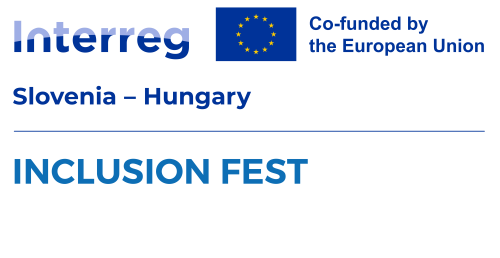
Project title: Strengthening cross-border ties through intercultural dialogue of all generations
Project budget (ERDF co-financing): EUR 20.312,50
Project duration: 1.4.2024 – 30.6.2024
Project Partners: Korenika, zavod za usposabljanje in zaposlovanje invalidnih oseb, Šalovci; MURABA KORLÁTOLT FELELŐSSÉGŰ EURÓPAI TERÜLETI TÁRSULÁS
Pomurje and Porabje are bordering rural regions, that face many common development challenges, such as long-term unemployment, low level of business activity, emigration of young people, aging population and social exclusion, especially of the elderly. In rural areas, there are certain social welfare services, especially for the elderly, but they are often not used, due to low connectivity and lack of information among potential users. Associations and non-governmental organizations play a strong role in rural areas, which take care of intergenerational bonding on a micro level and organize many social activities. There are also examples of good practice in social entrepreneurship in Šalovci and Szentgotthárd (Monošter), whose purpose is to build an entrepreneurial story and create positive social effects precisely through the training and employment of vulnerable groups. Partners Korenika and Muraba have a common mission, which is primarily based on connecting key organizations and users in the direction of reducing social exclusion and improving services for vulnerable groups in rural areas. Through the organization and implementation of events, we will connect key institutions in the field of social and disability care with the non-governmental sector and potential beneficiaries as well as the general public. By holding festivals, we will encourage trust, increase the level of mutual understanding and the connection of residents in the cross-border area. By holding consultations and cultural events within the all-day festivals in Šalovci and in Szentgotthárd, we will connect key actors who address the needs of vulnerable groups, the needs of the countryside, create new links in cooperation and promote intergenerational solidarity. The project is extremely important for raising awareness, informing and connecting several to find solutions. As part of the festivals, we will establish an intercultural dialogue through gatherings and individual debates. This way, the partners will achieve results at a significantly higher level with a cross-border approach. Korenika will take care of the coordination of the project, the organization of the event in Šalovci, and participate in the design and execution of the program of the event in Szentgotthárd. Korenika will also prepare cues and lead individual consultations, debates and attract key institutions on the Slovenian side. The partner Muraba will take care of the cultural part and the coordination of participating organizations in Hungary. Both events will have a joint organizing team. By organizing public cross-border events, we will strengthen mutual relations, create new links in civil society cooperation, promote cross-border intergenerational solidarity, trust and intercultural dialogue. We will strengthen the role of associations (youth and elderly associations), social enterprises and connect them with a network of public institutions and non-governmental organizations. Two public joint cross-border events will be organized, where at least 30 providers will present themselves and 400 visitors are expected. The programme of events will be in three sections: professional, cultural and social. The expert consultations will be aimed at public institutions, social enterprises, local authorities and the public. The first event will take place in April or in May at the Korenika social farm in Šalovci, and the second one, will take place in Szentgotthárd in August. Service providers in rural areas will participate as speakers and will outline the key challenges in the cross-border area together with the visitors through the consultation. A network of key institutions in the field of social and disability care will be formed, which will improve their cooperation by transferring information and good practices. Intercultural dialogue and the presence of both the younger and older generations will be key to comprehensively addressing the challenges in the countryside. The event in Szentgotthárd will focus on the users of the services, namely the young, the elderly and the disabled. The round table will be dedicated to them and will include their participation. They will present their point of view, needs and outline the possibilities of intergenerational cooperation to the institutions. After the completion of the project, the partners Korenika and Muraba will continue to build on the mission and cooperate in the long term to strengthen cross-border ties between generations. The cultural and social part of the events will take place in parallel with the professional part. In Slovenia, the event will focus on the relationship to natural and cultural heritage, including agriculture, while the event in Szentgotthárd will focus mainly on cultural heritage (preserving history and tradition).
Source: application form (SIHU00106)
Guidelines for Beneficiaries
Workshops for Beneficiaries
The first workshops for beneficiaries will be carried out after project approval in th frame of the first deadline of the Open Call for Proposals for standard projects.
Text for Workshop
